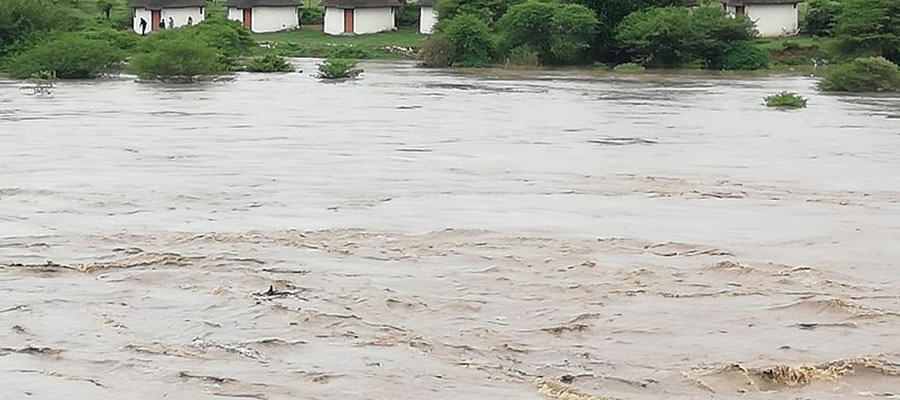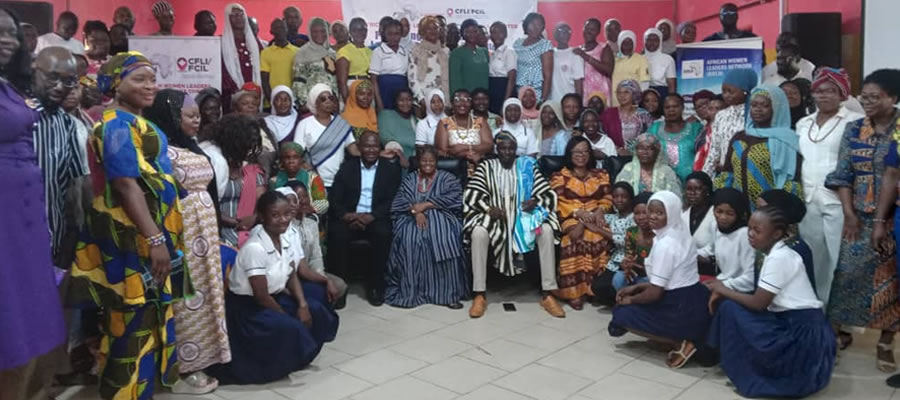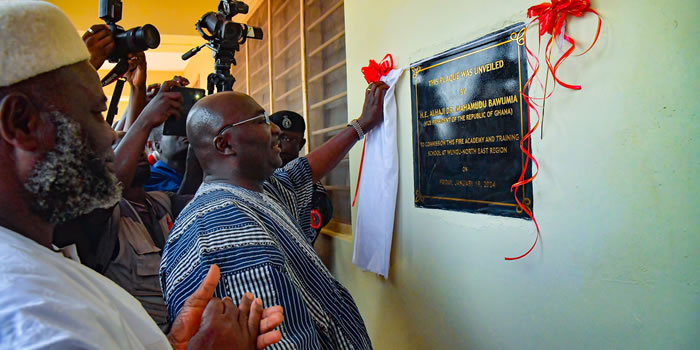

The District intends to achieve a considerable level of development in Agriculture and related areas since its economic base is largely that of Agric with about 77.4% of the population directly engaged in farming. In this it is expected that the rich Agric land will be opened to production by bridging of the White Volta at Binbinni. Besides boosting Agric the intervention will also improve health services delivery and promote educational development in the Overseas area. Not less than 15 new communities are expected to be electrified and all ongoing electrification projects completed.
Also, in terms of human resources development, education stands tall. It is considered as the sector that can serve as a spring board to achieving economic success and political attainment. With fewer than 24% of the population being literates, an upgradement of the literacy levels of the people will surely raise the people from the current economic and political as well as socio-cultural doldrums. To this end, the projected improvements here is to achieve improved classroom and teacher accommodation in not less than 40 communities with about 45 model school infrastructure. This involves the replacement of mud structures, removal of schools under trees and renovation of old structures.
Infact, it has been recognised that all these will take place if there is harmony with body and soul. This means that a sound body condition of all the people of the District as well as its neighbours is necessary. This makes health, good drinking water and sanitation equally important around which the lives of the people revolves. Consequently, the MTDP is focused on achieving the following within the medium term.
The plan is expected to yield some good results towards improving life of the disadvantaged and deprived segment of the society if implementation goes according to schedule. Several vulnerable groups will be made productive to support themselves and the District Economy.
The environment is expected to be given a boost with the able support of the UNDP drylands project, the Savanna Resources Wildlife protection programme and District Assembly and CBRDP support programmes on afforestation.
District Development Objectives
To ensure the enjoyment of socio-economic facilities and to improve on livelihoods and general improvement in the standard of living of the people of the West Mamprusi District, the following development objectives were formulated. These objectives formulated according to thematic areas of GPRS II are expected to change the lives of the people for the better.
Priorities for Private Sector Competitiveness
Agriculture Develoment
1. To Ensuring sustainable food security through improved crop and livestock production by the 2009.
2. To facilitate the development and growth of cottage industries by 2008.
3. Build the capacity of 60 organised groups to process shea-butter for export by 2009
4. To improve access and travel safety to rural farming areas from the district capital to boost farming and trade by the year 2009.
5. To create the enabling environment for the development of Local Economic Potentials.
6. To attract the youth in Agric through support to high valued & profitable Agric based products 2009
ICT
To facilitate access to and utilisation of ICT facilities to improve productivity and expand opportunities by 2008
Toursim
To develop five (5) potential tourist sites by the year 2009.
Post & Telecommunication
To improve and expand communication facilitation trade local Community development by 2009
Human Resource Development
Health
- To Improve the Health Infrastructure in the District to expand coverage of health service delivery By 2009
- To Provide Basic Medical equipment to at least 4 remote Health facilities by 2009.
- To Reduce Child And Maternal Mortality By 75% By 2009
- To Improve capacity of the District health Machinery in staffing (98 to 188) and Logistics needs by 2009.
- To encourage the patronage of family planning services by providing adolescent friendly centres by 2009.
Education
1. To improve physical access to educational facilities in rural farming communities by the year 2009.
2. To increase retention rate in schools by the year 2009.
3. To increase the number of Trained Teachers from 48.8% to 80% by the year 2009.
4. To provide adequate teaching and learning materials to all schools in the district by 2009.
5. To upgrade Walewale Secondary School to a model senior secondary school by 2008
Water and Sanitation
- To increase portable water coverage from 51.6% to 70% by the year 2009.
- To improve sanitation facilities coverage from 31.5% to 65% by the year 2009
- To make the District capital and 8 other large communities model clean areas for emulation by
- To discourage the burial of corpses in houses by 2009
Population Management
1. To integrate population variables fully into development planning in the District by 2009Urban Develpment
2. To provide a multi-purpose recreational centre for the District by the year 2009.
3. To improve housing and accommodation needs of District Assembly workers by 2009.
4. To expand Walewale town scheme and extend settlement planning to 6 other communities of the District by 2009.
5. To build the capacity of the Town and Country Planning unit of the DA to better handle settlement planning in the District
by 2009.
6. To acquire all lands set aside for public places in Walewale Township by 2009.
- To ensure that all the local government structures are operational by the year 2009.
- To develop five (5) potential tourist sites by the year 2009.
- To improve and enhance the productivity of the District Assembly by 2008
- To Strengthen the security network of the District by 2008
- To promote justice dispensation in the District by 2009
- To increase the internally generated revenue by 45% by 2009
- To facilitate gender mainstreaming and participation in the development process by 2009
- To adopt issues of vulnerability and the exclusion as a key developmental agenda for poverty reduction by 2009.
- To prevent and control the spread of HIV/AIDS in the District by 2009
- To ensure strong intuitional linkages for higher performance by 2008
Environment
1. To control wildfire and reduce losses from fire disasters in 6 Area Councils by 2009
2. To make tree planting a profitable venture and attractive to all by 2009
3. To equip 1000 farmers and all tractor operators on proper tillage practices and soil enrichment practices by 2009.
4. To control sand winning and reduce practices that cause the drying up of rivers by 2009
5. To ensure a support base for the sustainable and profitable exploitation of natural resources of plants and animals by 2009.
Development Programmes
The Development Focus of the District for 2006 to 2009
The broad District Development programme has been carved in line with the thematic areas of the main Growth and Poverty Reduction Strategy thematic areas of Private sector competitiveness, Human Resources Development and Good Governance and Civic Responsibility.
Consequently, the development focus of the District Assembly which equally fall in line with the District vision of A satisfaction of essential needs of the people in the district, alleviation of poverty, reduction and control of diseases, equitable access to education and reduction of illiteracy, and the creation of an enabling environment for private sector participation in district development activities so as to realise the soci-economic benefits of a transformed modern economy. The broad programmes of action formulated in a logical frame are as outlined below.
Development Priorities
The West Mamprusi District is largely agrarian in nature with 77.4% of the people engaged in farming. As such the majority of the people live in the rural areas. There is little support to raise the economic base of the people and service related opportunities are concentrated only in the District capital which is the largest of its kind in the whole District. There is no doubt that the people from the hinterlands especially the youth congregate there on daily bases to enjoy urban life and facilities.
Notably the District’s rural environment suffers among others, poor support base for Agric production, poor educational infrastructures leading to overcrowding in Walewale town schools, underdeveloped health infrastructure and services delivery, Private sector support programmes that will improve the livelihood of the majority of the population engaged in farming and its related activities of processing and packaging will be an overwhelming development.
However, the thriving of the private sector rest on a sound human resources base of the area. No doubt that the District has identified human resources development especially education and health as its top priorities to propel the other sectors to ensure the equitable development sought. These it is noted will be realised only under sound conditions of good governance and a responsible citizenry with a strong attitudinal change.
Consequently, the West Mamprusi District has identified the following key priority development intervention areas to be addressed so as to accelerate the development of the Area. With respect to the thematic areas of the GPRS II, the prioritised intervention areas are as follows:
Private Sector Led Competitiveness
Agriculture
1. Provision of irrigation facilities to support dry season farming and to create employment to curb youth migration.
2. Establishment of Agro-processing industries and equipment for small scale processing
3. Improvement of access roads and opening of new ones to expand road network
4. Institute measures to market farm produce
5. Improve land and water management to replenish soil fertility
6. Provision modern storage facilities to reduce post harvest losses
7. Make farming attractive to the youth
8. Raising support base for farmers to obtain tractors
9. Create avenues for improved access to farming inputs at competitive cost
10. Support capacity building to AEAs to support improve services to farmers
11. Solicit credit support to farmers for improved earning from farming
Energy
- Completion of ongoing rural electrification
- Upgrading of single phase power supply to three phases.
- Improvement of techniques charcoal and fire wood sources for cooking
- Support woodlot development to renewable energy production.
- Revive and improve rural kerosene supply for lighting in the rural areas
Transportation
1. Open up all strategic road linkages/network
2. Improve on bad spots of roads to make them motorable all year round
3. Provide intermediate means of transport (IMTs) to the local areas
4. Clear all unserviceable vehicles on the roads in the District
5. Procure new vehicles and lobby for some from government
6. Introduce metro mass transit services
Post And Telecommunication
- Expand tele-communication and postal services in the District
- Provide radio communication facilities in all Area Council offices and health centres
ICT
Promote internet services in the District and in all departmental offices
Tourism
1. Untapped tourist potentials
2. Poor accommodation for tourists
LED
- Organised local business groups/Associations
- Improved electrical power to support light industrial activities
- Development of skills on business/enterprise development
- Provision of credit to support local economic development activities
- Establishment of a well marked out location for housing light industries
- Development of the District tourist potentials
Human Resources Development
Education
1. Expansion of classroom and teacher accommodation
2. Institution of measures to get teachers to stay in the deprive rural areas
3. Improvement of school structures and accommodation for teachers
4. Training of more teachers
5. Expansion of Teaching and learning materials
6. Poor physical access to school in some parts of the District
7. Poor hygiene practice among school children
8. provision of gender friendly sanitation facilities in most schools
9. construction of purposely built ECD centres in the District
10. provision of standard Library facility for the District
Health
- Improvement of accommodation for health workers
- Provision of adequate ITNs and high incidence of malaria in the area
- Sponsorship of training of health workers to man the health facilities
- Provision of adolescent friendly facilities
- Establishment of more outreach services
- Improved access to health facilities
- Improved information dissemination on the National Health Insurance
- Strengthening of the capacity of the National Health Insurance outfit to expand and monitor coverage.
- Improved patronage of health services
- Improved information on Nutrition in the District
Water And Sanitation
1. Increase access to potable water supply in the District
2. Raise coverage of sanitation facilities for households and the public
3. Promote good hygiene practice
4. Improved waste disposal practices
5. Improvement of water sitting and borehole drilling
Population Management
- Conscious efforts at integrating population into development effort
- Support for demographic database to support planning in the District
- Intensification of population control measures
- Urban Development, Housing And Slump Upgrading
- Opening of town roads to facilitate easy movement
- Development/improvement of local building materials
- Expand accommodation facilities
- Designing of planning schemes for the upcoming towns of the District
- Build the capacity of the Town and Country Planning Department of the District to handle settlement planning.
Responsibility
1. Operationalisation of Area Council staff
2. Equipping the Area Councils
3. Rehabilitation of Area Council offices
4. Intensification of revenue generation by Areas
5. Improvement of transport and communication of the Area Councils
Environment
1. Management of wildfires
2. Mass reforestation for firewood and charcoal burning
3. Intensification of land and water management
4. Attitudinal change in tree planting in the District.
5. Education on the use of chemicals
6. Vigorous dryland management
7. Proper management of wildlife resources in the District
8. Support for alternative livelihood that will redirect attention from natural resources exploitation in a sustainable fashion
Vulnerability
- Measure to curb incidence of child migration and child trafficking
- Support and care for the orphaned
- Establishment of facilities for the aged
- Setting up of children play grounds in the District
- Intensification on behavioural change on HIV/AIDs in the District
- Capacity building for people with disabilities to be productive
Civic Responsibility
1. Empowerment of the civil society to participate in local development
2. Full citizens participation in local development
3. Improved involvement of women in decision making at all levels.
Security & Justice
- Establishment of a District police headquarters
- Ensure police presence at the overseas and Janga areas of the District.
- Ensure a crime-free environment especially along the district road artery
- Provision of a standard court infrastructure for the District
Institutional Strengthening And Collaboration
1. Support for staff capacity building
2. Institute motivational packages to get local government staff to perform
3. Enhanced interdepartmental collaboration/cooperation
4. Proper coordination of NGO activities
5. Establishment of an up to date database
6. Annual Action Plan
The broad District Development programme has been carved in line with the thematic areas of the main Growth and Poverty Reduction Strategy thematic areas of Private sector competitiveness, Human Resources Development and Good Governance and Civic Responsibility.
Consequently, the development focus of the District Assembly which equally fall in line with the District vision of A satisfaction of essential needs of the people in the district, alleviation of poverty, reduction and control of diseases, equitable access to education and reduction of illiteracy, and the creation of an enabling environment for private sector participation in district development activities so as to realise the soci-economic benefits of a transformed modern economy. The broad programmes of action formulated in a logical frame are as outlined below.
Date Created : 11/27/2017 3:42:23 AM











 facebook
facebook
 X
X
 Youtube
Youtube
 instagram
instagram
 +233 593 831 280
+233 593 831 280 0800 430 430
0800 430 430 GPS: GE-231-4383
GPS: GE-231-4383 info@ghanadistricts.com
info@ghanadistricts.com Box GP1044, Accra, Ghana
Box GP1044, Accra, Ghana